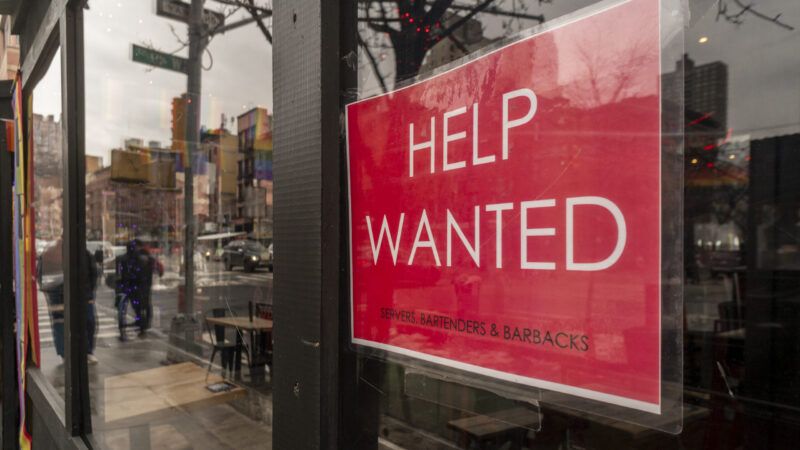America Added 467,000 Jobs in January Despite Omicron Surge
The pandemic isn't over, but the economy is over the pandemic. Politicians should take note.

Despite an unprecedented surge in COVID-19 cases, the U.S. economy added 467,000 jobs in January—an encouraging signal that, after nearly two years, the economy's fate is no longer closely tied to the pandemic.
Labor force participation also jumped in January, reaching 62.2 percent—a level not seen since before the pandemic began. That's another welcome sign that more Americans are seeking to fill the glut of available jobs. The unemployment rate ticked up slightly to 4 percent because of the rising labor force rate.
The monthly jobs report, released Friday by the Department of Labor, was significantly more upbeat than projections anticipated. Some economists expected slow or even negative growth after a month where the omicron variant of COVID-19 had caused widespread disruptions—and an expansion of mask and vaccine mandates in some jurisdictions. Beating those expectations shows that the economy didn't merely muddle through a difficult month, but continued growing despite the pandemic's continued impact.
Indeed, one conclusion that could be drawn from Friday's report is that the pandemic is now primarily affecting the political arena, not the economic one.
In the same release, the Labor Department also revised upward job figures from November and December, showing that the economy added about 700,000 jobs during those two months. Together with January's data, we now have a full picture of the economy during the omicron wave, and the overall picture is highly encouraging. Vaccines and other treatments have blunted the most severe outcomes of COVID-19, allowing Americans who wish to resume nearly normal lives to do so—and many have done so, despite the number of new infections.
That means it's time for officials to take a serious look at the pandemic policies that remain in place (and, in some cases, were expanded during the omicron wave.) Schools should be fully open and kids unmasked. Government-imposed vaccine and mask mandates should be removed to allow consumers and businesses to determine their own levels of risk. The rest of the country is living with the pandemic, and politicians should take notice—particularly in situations where there is little evidence that those policies are having an effect.
Been seeing a lot of governors crediting their mask mandates for "defeating" the Omicron wave. Thought I'd plot COVID cases in states with mask mandates vs. states without them, and, well… pic.twitter.com/WdhsyCINjp
— Eric (@The_OtherET) February 3, 2022
Of course, we're not yet back to the pre-pandemic normal. The economy is about 2.9 million jobs short of where it was in February 2020, and there are about 60 unemployed workers for every 100 job openings, according to a different set of government data released a few weeks ago.
That's a powerful argument for expanding immigration to help fill job openings—but the Biden administration has so far been unwilling to shed many of the anti-immigration policies imposed by its predecessor.
"We can't get inflation under control, unclog our supply chains, or fully grow our economy unless we fill these open jobs," Suzanne P. Clark, president and CEO of the U.S. Chamber of Commerce, said in a statement earlier this week. Clark said recent actions by the Biden administration to increase H-2B visas (which are given to temporary nonagricultural workers) were a positive step but added that "addressing the worker shortage crisis needs to be a top priority for the administration and Congress."
While there is still plenty of room for improvement on the political side of the pandemic, it seems clear that the economic recovery is running full steam ahead. For anyone who lived through the nightmarish job figures in March and April 2020, this represents a stunning, and welcome, turnaround in less than two years.
Here's the chart showing just how remarkable this rebound is
(chart via @calculatedrisk ) pic.twitter.com/AfZP7HjgFc— Heather Long (@byHeatherLong) February 4, 2022
The pandemic isn't over, but the economy is nearly over the pandemic. That's great news.
Show Comments (46)